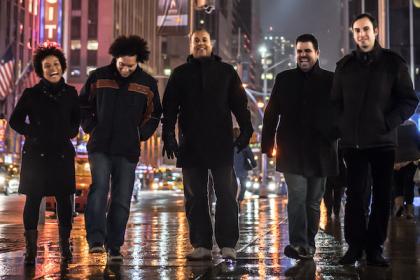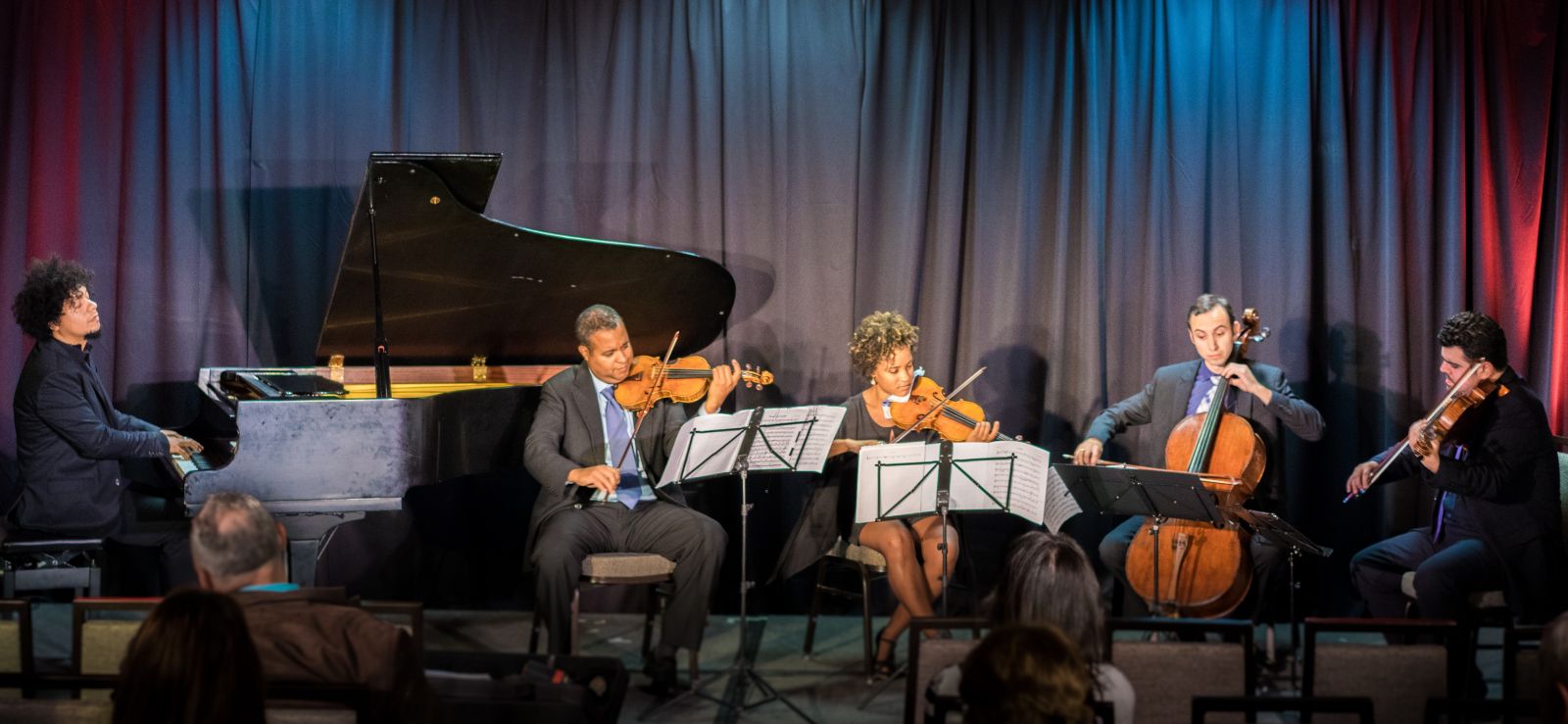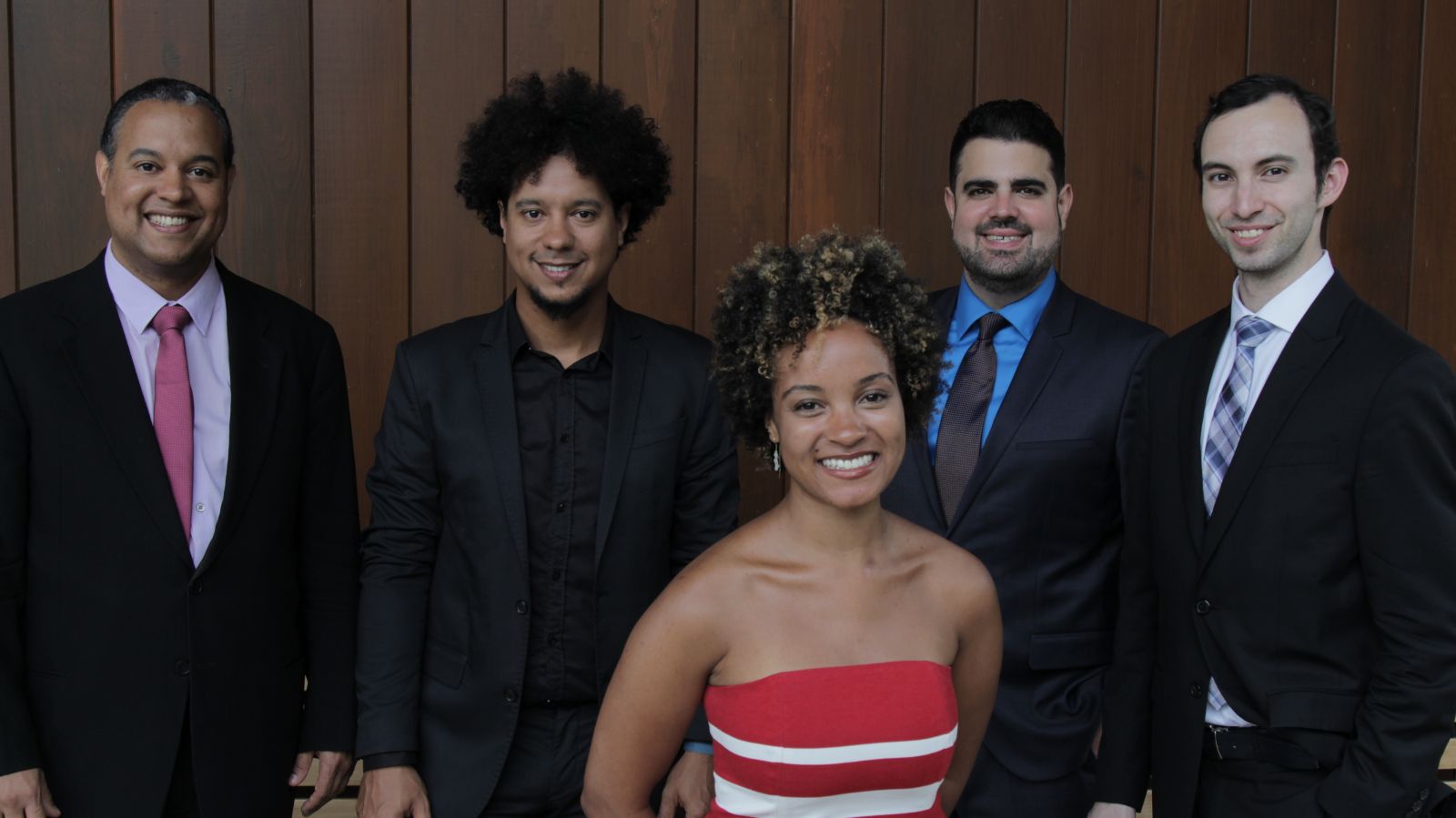Harlem Quartet & Aldo López-Gavilán • IN-PERSON
Harlem Quartet & Aldo López-Gavilán • IN-PERSON

Event Attributes
Presented By
For more information regarding accessible accommodations, please click here.
Known for their flamboyant and dynamic style, Harlem Quartet advances diversity in classical music while engaging audiences with underperformed repertoire. From their 2009 performance for former President and First Lady Barack and Michelle Obama to a highly successful South African tour, the quartet performs around the world with such distinguished artists as Itzhak Perlman, Ida Kavafian, Jeremy Denk, Chick Corea and, as in this program, Aldo López-Gavilán. A Cuban piano virtuoso and brother of quartet member Ilmar Gavilán, López-Gavilán is praised for both his classical and jazz technique. He wrote his first composition at age five, and in this program, we hear five of his exuberant works.
Harlem Quartet is committed to diverse programming, a collaborative approach and an ongoing commitment to educational residency and outreach. In 2021-22, the quartet will perform livestreamed performances for K-12 students across Prince George’s County Public Schools. In addition, the quartet will appear as part of The Clarice’s Arts Citizenship Talks (ACTnow) series in partnership with UMD’s Latin American and Caribbean Studies Center and will be part of the UMD School of Music’s Renegade series, which features innovative artists of various disciplines.
Program:
Robert Schumann: Piano Quintet in E-flat major, Op. 44
Aldo López-Gavilán: Viernes de Ciudad
López-Gavilán: Talking to the Universe
López-Gavilán: Eclipse
López-Gavilán: Aegean Dreams
López-Gavilán: Pan con Timba
This engagement of Harlem Quartet & Aldo López-Gavilán is made possible through the ArtsCONNECT program of Mid Atlantic Arts Foundation with support from the National Endowment for the Arts. Additional support was provided by the Maryland State Arts Council and the Morris & Gwendolyn Cafritz Foundation.

.png)

fghgf
PROGRAM MENU: PROGRAM • ABOUT THE ARTISTS • PROGRAM NOTES • MULTIMEDIA
Program
Robert Schumann (1810-1856)
Piano Quintet in E-flat major, Op. 44 (35 minutes)
Allegro brillante
In modo d’una marcia. Un poco largamente
Scherzo: Molto vivace
Allegro ma non troppo
Aldo López-Gavilán (b. 1979)
Viernes de Ciudad (10 minutes)
López-Gavilán
Talking to the Universe (8 minutes)
López-Gavilán
Eclipse (5 minutes)
López-Gavilán
Aegean Dreams (10 minutes)
López-Gavilán
Pan con Timba (7 minutes)
The performance will be 1 hour and 15 minutes with no intermission.
About the Artists
THE ARTISTS ON CAMPUS AND IN THE COMMUNITY
The Clarice is committed to creating extensive opportunities for our campus and community to engage with Visiting Artists throughout the season. During their time with The Clarice, Harlem Quartet will have engaged in:
- A pre-concert talk with students and audience members
- Livestreamed performances for K-12 students across Prince George’s County Public Schools
- The Clarice’s Arts Citizenship Talks (ACTnow) series in partnership with UMD’s Latin American and Caribbean Studies Center—Register Here
- A class visit with UMD School of Music’s chamber music class
- A presentation as part of UMD School of Music’s Renegade series
HARLEM QUARTET WITH ALDO LÓPEZ-GAVILÁN
Harlem Quartet’s performances with Cuban pianist/composer Aldo López-Gavilán offer a joyously energetic concert experience. The collaboration reunites López-Gavilán with his older brother, violinist Ilmar Gavilán, who left Cuba at age 14 and went on to co-found Harlem Quartet. López-Gavilán and the quartet showcase scintillating chemistry in a broad variety of repertoire. Programs include American jazz standards, bossa nova classics and, of course, several original compositions from López-Gavilán that take audiences on a journey through Cuba’s myriad musical traditions. The new documentary Los Hermanos / The Brothers tells the story of Aldo and Ilmar, tracking their shared childhood, their momentous first performances together and their parallel lives as musicians. A Patchwork Films production by Marcia Jarmel and Ken Schneider, it includes concert footage of the quintet, a genre-bending score composed by Aldo and guest appearances by such legendary musicians as Joshua Bell. Los Hermanos is screening at film festivals worldwide and will be nationally broadcast on PBS in the fall of 2021.
ENSEMBLE
Ilmar Gavilán, violin
Melissa White, violin
Jaime Amador, viola
Felix Umansky, cello
Aldo López-Gavilán, piano
Program Notes
ABOUT ALDO LÓPEZ-GAVILÁN’S COMPOSITIONS
Epílogo was originally written for piano, clarinet and orchestra. The central theme, lyrical and highly modulatory, explores a dream and makes a triumphant musical gesture reminiscent of “Nueva Trova,” a style pioneered and made world-famous by troubadour singers Silvio Rodriguez and Pablo Milanés. The development section showcases Aldo's take on a characteristic canon, with kaleidoscopic rhythms staggered across both instruments.
Talking to the Universe, also the title of one of Aldo's earlier albums, originated as a solo piano work. It then evolved into a piece for piano and jazz band, then to one for piano, jazz band and orchestra. It aims to convey the emotions of a person sending a “message in a bottle” out to the universe, and the ensuing vibrancy and wholeness that comes with feeling at one with the cosmos. The quintet version captures these intimate and yearning qualities, employing complex and exhilarating counterpoint that gradually increases in energy as the piece progresses
Eclipse, originally for violin and piano, is a very personal piece written for Aldo’s brother Ilmar. It addresses vulnerability and the emotional toll taken by the two brothers’ involuntary separation due to outside political circumstances as Ilmar went to the United States while Aldo remained in Cuba.
Pan con Timba, whose title means “bread with unknown something,” is consistently joyful and contagiously optimistic. It reflects the classic mood of post-revolutionary Cuba: the younger generation, faced with scarcity and economic hardship, refused to indulge in self-pity and instead embraced humor as a psychological lifting device. This form of humor has become an essential part of the current Cuban identity. Pan con Timba features such rhythmic characteristics as the quintessentially Cuban form of ostinato known as “tumbao,” and also intertwines elements of various dance styles popular in contemporary Cuba.
Multimedia
ARTIST PHOTOS



